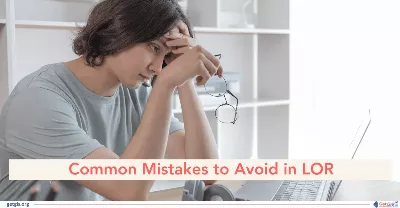9 Common Mistakes to Avoid in LOR: Guide for Study Abroad Aspirants
Updated On
-
Copy link
LOR if done right adds depth & credibility; if not, they can even harm your chances of approval. Learning the common mistakes to avoid in LOR for students and recommenders, along with what admission committees actually care about, can help your approval.
Limited-time offer : Access a free 10-Day IELTS study plan curated for you

Table of Contents
- 9 Common Mistakes to Avoid in LOR
- 1. Choosing the Wrong Recommender
- 2. Making a Request Too Late or Too Casually
- 3. Supplying Incomplete or Incorrect Submission Information
- 4. Use of Generic or Vague Language
- 5. Recommender Does Not Address Fit for the Program
- 6. Overinflated or Contradictory Claims
- 7. Submitting Identical Letters (the Template Trap)
- 8. Not Using Recommenders Strategically for Different Programs
- 9. Typos, Formatting Errors, or Submission Mistakes
- Essential Pointers for Drafting Your LORS in 2026
- Connect With GetGIS For the Right Study Abroad Guidance
Letters of Recommendation (LORs) are one of the most crucial aspects of your application process. If done correctly, they add depth and credibility, and if not done right or poorly, they can be bland, inconsistent, or even harm your chances of approval. In this article, we will explore the top common mistakes to avoid in LOR for students and recommenders, highlighting what admission committees actually care about.
9 Common Mistakes to Avoid in LOR
Letter of Recommendation LOR for students is not the single most important component of an application, but it certainly is a powerful tiebreaker for your graduate and professional school admissions, which can also help compensate for weaker test scores or explain unusual circumstances.
We have listed some of the most common mistakes to avoid while drafting an LOR and how you can fix them.
1. Choosing the Wrong Recommender
This is one of the common mistakes when students attempt to secure a LOR is picking someone famous or senior who barely knows them. Since the admission committee prefers credible, specific, and firsthand observations over name recognition, having a generic glowing letter from a distant contact could become hollow.
How to fix this?
Choose recommenders who have supervised your work closely, which include professors, internship managers, team leads, etc If you need an endorsement from a senior person, pair it with someone deeply familiar with your daily work.
2. Making a Request Too Late or Too Casually
The second most common mistake to avoid in a LOR is requesting a letter too late, that is, just before the week or deadline, or via an offhand message. Rushed letters are generally short, vague, and full of errors, which generally leads to recommenders declining when insisted.
How to fix this?
Request for LORs formerly, at least 4 to 6 weeks in advance and also ensure to provide organised supporting documents like CV, transcripts, a draft of personal statement, short reminder of projects you worked on, deadlines, submission instructions, etc.
3. Supplying Incomplete or Incorrect Submission Information
Providing the wrong email address, missing forms, or expecting recommenders to figure out the portal would be one of the greatest mistakes to avoid in LOR. Technical errors are surprisingly common and can lead to missing letters or late submissions, generally resulting in the decline of your application.
How to fix this?
Double-check institutional submission procedures, including portal links, recommender email, file format, etc, and give step-by-step instructions and an optional calendar reminder to the recommenders
Also Read: Best Universities for Indian Students Abroad
4. Use of Generic or Vague Language
Letters of recommendation (LOR) that use only adjectives like excellent, outstanding, etc, without examples, sound very generic as admission officers see dozens of such letters and they do not find anything new. Research and admissions guides both have highlighted that letters (LORs) must provide concrete evidence to help stand out and successfully secure your admission
How to fix this?
Encourage recommenders to include anecdotes, metrics, or specific project outcomes like developed a productive model that improved accuracy by 18%, led a team of five in a high-stakes client project, etc, to ensure credibility.
5. Recommender Does Not Address Fit for the Program
A well-written letter of recommendation is not one that only praises the student generally, but does not link skills to the target program, as the admissions committee wants to know if the student is fit and will succeed in that program, and not just what makes them a nice person
How to fix this?
Ask recommenders to tailor the letter by mentioning attributes and experiences that match the program’s learning outcomes and research area.
6. Overinflated or Contradictory Claims
Including exaggerations like best student ever, or claims that do not match transcripts or resumes in the LOR could have a negative effect, as admission officers value credibility, and discrepancies raise doubt about the applicant and recommender
How to fix this?
Ensure to keep any phrases measurable and specific, like if you include terms like top 1%, include the content (like class size, cohort, etc)
Also Read: Best Country for Indian Students to Study MS in Economics in 2026
7. Submitting Identical Letters (the Template Trap)
There is no one-size-fits-all letter that can be reused across programs, or copy-pasted paragraphs from a template when drafting an effective LOR. When programs LOR highlight repetition, this signals low engagement by the recommender
How to fix this?
Provide a detailed description to recommenders on which programs need tailored emphasis (research vs professionals, technical vs leadership), and along with note to supply program names or descriptions.
8. Not Using Recommenders Strategically for Different Programs
One of the biggest mistakes to avoid in LOR is sending the same set of recommendations to widely different programs, like MBAs vs research PhDs. Different programs value different evidence, like, for example, leadership and team management for MBAs, research ability, and creativity for PhDs.
How to fix this?
Assemble Letters of Recommendation (LORs) to match the program goals. You can opt for supervisors and professors for research-integrated programs, while managers and project leads for professional programs
9. Typos, Formatting Errors, or Submission Mistakes
LORs with typos or wrong programme names, or incorrect file types, are generally termed sloppy letters, reflecting poorly on both the recommender and the applicant. Admissions offices could interpret them as a lack of seriousness, and further resulting in the refusal of admission and a visa
How to fix this?
Provide a checklist and request the recommenders review the uploaded file. If the recommender is using a portal, ask them to confirm submission and provide a screenshot or confirmation number for your reference
Also Read: 20 Common Visa Rejection Reasons
Essential Pointers for Drafting Your LORS in 2026
When writing a Letter of Recommendation (LOR) for a master's admission process, it is crucial to keep certain key points in mind to make your LOR impactful and tailored to the applicant's needs
|
Particular |
Details |
|
Emphasize specific achievements |
A strong LOR should go beyond general praise and focus on concrete accomplishments, highlighting particular projects, experiences, or milestones that reflect the candidate's academic and professional capabilities, making your letter more credible, persuasive, and personalised to the candidate's strengths. |
|
Leverage Professional Relationships |
Selecting a recommender who has closely worked with the applicant can make a substantial difference. A professionally connected recommender can provide detailed insights into the candidate's skills, work ethics, and growth potential. A personalised LOR enriched with examples of mentorship or collaboration demonstrates authenticity and depth |
|
Align With the Program's Expectations |
Before drafting the letter, it is essential to understand the specific requirements and purpose areas of the target program, tailoring the loan to reflect the program's values, research priorities, or academic objectives. This would show a thoughtful connection between the candidate's qualifications and the University's expectations. Such customised LORs highlight both the recommender's and candidate's commitment. |
|
Showcase Relevant Skills and Experience |
An effective LOR should clearly link the applicant's experience to the skills needed for success in the chosen master's program or phd, emphasizing relevant academic projects, internships, leadership roles, or technical abilities to help illustrate why the candidate is a strong fit for advanced studies. |
Also Read: Best Country for Indian Students to Study MS in Psychology 2026
Connect With GetGIS For the Right Study Abroad Guidance
A well-written letter of recommendation can make a significant impact on your university application. By avoiding common mistakes in your LOR and incorporating the best practices discussed above, you can present a compelling narrative of your achievements and potential.
For further assistance with your study abroad requirements and visa process, consider reaching out to trusted Guidance from GetGIS. Our study abroad experts provide personalised end-to-end guidance with all your study abroad requirements, visa application process, university shortlisting, and more, ensuring your successful education journey abroad.
Articles You Might Be Interested In
Limited-time offer : Access a free 10-Day IELTS study plan curated for you

Frequently Asked Questions
What should you avoid in a letter of recommendation?
What makes a bad letter of recommendation?
How to address weaknesses in a letter of recommendation?
What is the best opening statement for a letter of recommendation?
What are the three components of a letter of recommendation?





